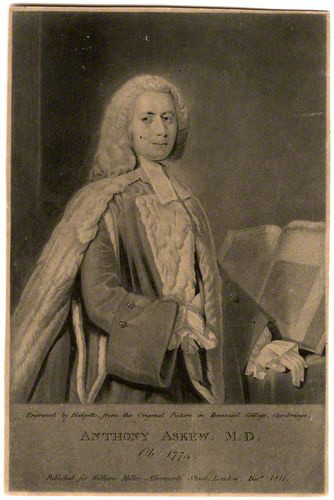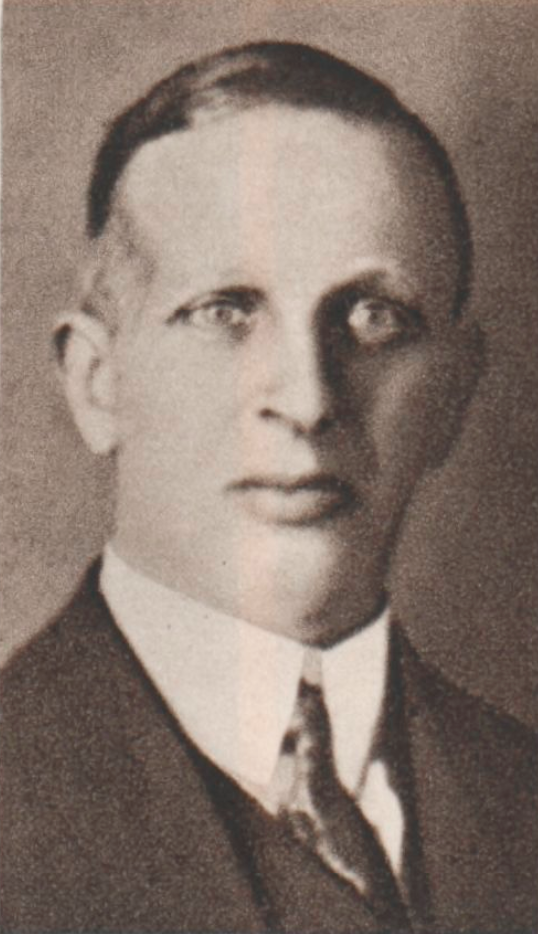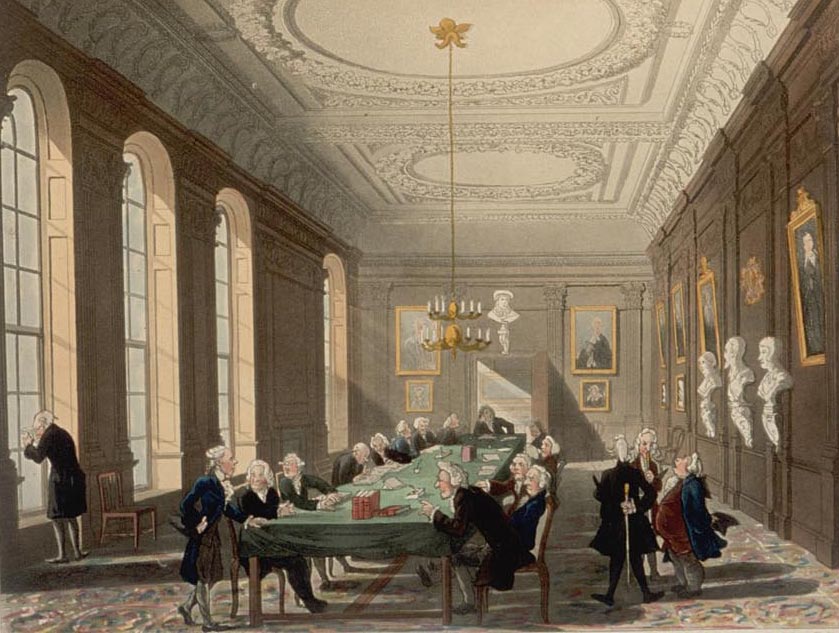|
Anthony Askew
Anthony Askew (1722–1774) was an English physician and is best known for having been a book collector. His collection was purchased by the British Museum and books purchased by George III of Great Britain were added to the King's Library. Life and work Askew was born in 1722 in Kendal, Westmorland, the son of Dr. Adam Askew, a well-known physician of Newcastle and Ann Crackenthorp. He was baptised in Kendal on 7 May 1722. The family moved to Newcastle in 1725. His early education was at Sedbergh School and The Royal Free Grammar School in Newcastle upon Tyne. According to a fellow physician, he was terrified of the formidable Head Master, Richard Dawes. (Dictionary of National Biography is available under the Creative Commons Attribution/Share-Alike License) He was married twice. He first married Margaret Swinburn; they had no children. The second time to Elizabeth Holford, by whom he had twelve children, six girls and six boys. Elizabeth was born in 1734 and died on 2 Aug ... [...More Info...] [...Related Items...] OR: [Wikipedia] [Google] [Baidu] |
Leiden University
Leiden University (abbreviated as ''LEI''; ) is a Public university, public research university in Leiden, Netherlands. Established in 1575 by William the Silent, William, Prince of Orange as a Protestantism, Protestant institution, it holds the distinction of being the oldest university in the Netherlands of today. During the Dutch Golden Age scholars from around Europe were attracted to the Dutch Republic for its climate of intellectual tolerance. Individuals such as René Descartes, Rembrandt, Christiaan Huygens, Hugo Grotius, Benedictus Spinoza, and later Baron d'Holbach were active in Leiden and environs. The university has seven academic faculties and over fifty subject departments, housing more than forty national and international research institutes. Its historical primary campus consists of several buildings spread over Leiden, while a second campus located in The Hague houses a liberal arts college (Leiden University College The Hague) and several of its faculties. It i ... [...More Info...] [...Related Items...] OR: [Wikipedia] [Google] [Baidu] |
Seymour De Ricci
Seymour de Ricci (1881-1942) was a bibliographer and historian, who was born in England and raised and became a citizen of France. Early years Seymour Montefiore Robert Rosso de Ricci was born in 1881 in Twickenham, United Kingdom. His parents were Helen Montefiore (c. 1860–1931) and James Herman de Ricci (1847–1900). He lived with his mother in Paris after 1890, when his parents divorced. His father was a colonial judge and a lawyer. Education and career Between 1890 and 1898, de Ricci attended the Lycée Janson de Sailly. He attended and subsequently received his bachelier ès lettres from École pratique des hautes études, Sorbonne in 1897. He went to Côtes-du-Nord, Brittany where he studied Roman inscriptions. He met Salomon Reinach, who would be a close friend and mentor, and Émile Guimet. He took an inventory of the inscriptions and published his first book about them in 1897. In 1901 he received his licence. He was a private scholar of epigraphy, Egyptology a ... [...More Info...] [...Related Items...] OR: [Wikipedia] [Google] [Baidu] |
Aeschylus
Aeschylus (, ; ; /524 – /455 BC) was an ancient Greece, ancient Greek Greek tragedy, tragedian often described as the father of tragedy. Academic knowledge of the genre begins with his work, and understanding of earlier Greek tragedy is largely based on inferences made from reading his surviving plays. According to Aristotle, he expanded the number of characters in the theatre and allowed conflict among them. Formerly, characters interacted only with the Greek chorus, chorus.The remnant of a commemorative inscription, dated to the 3rd century BC, lists four, possibly eight, dramatic poets (probably including Choerilus, Phrynichus, and Pratinas) who had won Dionysia#Known winners of the City Dionysia, tragic victories at the Dionysia before Aeschylus had. Thespis was traditionally regarded the inventor of tragedy. According to another tradition, tragedy was established in Athens in the late 530s BC, but that may simply reflect an absence of records. Major innovations in dramatic ... [...More Info...] [...Related Items...] OR: [Wikipedia] [Google] [Baidu] |
Bibliophile
A bookworm or bibliophile is an individual who loves and frequently reads or collects books. Bibliophilia or bibliophilism is the love of books. Bibliophiles may have large, specialized book collections. They may highly value old editions, autographed copies, or illustrated versions. Bibliophilia is distinct from bibliomania, a compulsive obsession to collect books which can affect interpersonal relationships or health. The term "bibliophile" has been in use since 1820 and has been associated with historical figures like George Spencer, 2nd Earl Spencer, Lord Spencer and J.P. Morgan, who were known for their extensive book collections. Profile The classic bibliophile loves to read, admires and collects books, and often amasses a large and specialized collection. Bibliophiles usually possess books they love or that hold special value, as well as old editions with unusual bindings, autographed, or illustrated copies. "Bibliophile" is an appropriate term for a minority of those w ... [...More Info...] [...Related Items...] OR: [Wikipedia] [Google] [Baidu] |
Classical Scholar
Classics, also classical studies or Ancient Greek and Roman studies, is the study of classical antiquity. In the Western world, ''classics'' traditionally refers to the study of Ancient Greek literature, Ancient Greek and Roman literature and their original languages, Ancient Greek and Latin. Classics may also include as secondary subjects Greco-Roman Ancient philosophy, philosophy, Ancient history, history, archaeology, anthropology, classical architecture, architecture, Ancient art, art, Classical mythology, mythology, and society. In Western culture, Western civilization, the study of the Ancient Greek and Roman classics was considered the foundation of the humanities, and they traditionally have been the cornerstone of an elite higher education. Etymology The word ''classics'' is derived from the Latin adjective ''wikt:classicus, classicus'', meaning "belonging to the highest class of Citizenship, citizens." The word was originally used to describe the members of the Patri ... [...More Info...] [...Related Items...] OR: [Wikipedia] [Google] [Baidu] |
Royal College Of Physicians
The Royal College of Physicians of London, commonly referred to simply as the Royal College of Physicians (RCP), is a British professional membership body dedicated to improving the practice of medicine, chiefly through the accreditation of physicians by examination. Founded by royal charter from King Henry VIII in 1518, as the College of Physicians, the RCP is the oldest medical college in England. The RCP's home in Regent's Park is one of the few post-war buildings to be listed at Grade I. In 2016 it was announced that the RCP was to open new premises in Liverpool at The Spine, a new building in the Liverpool Knowledge Quarter. The Spine opened in May 2021. History The college was incorporated as "the President and College or Commonalty of the Faculty of Physic in London" when it received a royal charter in 1518, affirmed by Act of Parliament in 1523. It is not known when the name "Royal College of Physicians of London" was first assumed or granted. It came into use aft ... [...More Info...] [...Related Items...] OR: [Wikipedia] [Google] [Baidu] |
Royal Society
The Royal Society, formally The Royal Society of London for Improving Natural Knowledge, is a learned society and the United Kingdom's national academy of sciences. The society fulfils a number of roles: promoting science and its benefits, recognising excellence in science, supporting outstanding science, providing scientific advice for policy, education and public engagement and fostering international and global co-operation. Founded on 28 November 1660, it was granted a royal charter by Charles II of England, King Charles II and is the oldest continuously existing scientific academy in the world. The society is governed by its Council, which is chaired by the society's president, according to a set of statutes and standing orders. The members of Council and the president are elected from and by its Fellows, the basic members of the society, who are themselves elected by existing Fellows. , there are about 1,700 fellows, allowed to use the postnominal title FRS (Fellow ... [...More Info...] [...Related Items...] OR: [Wikipedia] [Google] [Baidu] |
College Of Physicians
A college (Latin: ''collegium'') may be a tertiary educational institution (sometimes awarding degrees), part of a collegiate university, an institution offering vocational education, a further education institution, or a secondary school. In most of the world, a college may be a high school or secondary school, a college of further education, a training institution that awards trade qualifications, a higher-education provider that does not have university status (often without its own degree-awarding powers), or a constituent part of a university. In the United States, a college may offer undergraduate programs – either as an independent institution or as the undergraduate program of a university – or it may be a residential college of a university or a community college, referring to (primarily public) higher education institutions that aim to provide affordable and accessible education, usually limited to two-year associate degrees. The word "college" is generall ... [...More Info...] [...Related Items...] OR: [Wikipedia] [Google] [Baidu] |
St Bartholomew's Hospital
St Bartholomew's Hospital, commonly known as Barts, is a teaching hospital located in the City of London. It was founded in 1123 by Rahere, and is currently run by Barts Health NHS Trust. History Early history Barts was founded in 1123 by Rahere (died 1144, and entombed in the nearby Priory Church of St Bartholomew the Great), a favourite courtier of King Henry I. The dissolution of the monasteries did not affect the running of Barts as a hospital, but left it in a precarious position by removing its income. It was refounded by Henry VIII in December 1546, on the signing of an agreement granting the hospital to the Corporation of London.''St Bartholomew's Hospital'' ''Old and New London'': Volume 2 (1878), pp. 359–363. Retrieved 30 January 2009 The hospital became legally styled as the "House of the ... [...More Info...] [...Related Items...] OR: [Wikipedia] [Google] [Baidu] |
Doctor Of Medicine
A Doctor of Medicine (abbreviated MD, from the Latin language, Latin ) is a medical degree, the meaning of which varies between different jurisdictions. In the United States, and some other countries, the ''MD'' denotes a professional degree of physician. This generally arose because many in 18th-century medical professions trained in Scotland, which used the MD degree nomenclature. In England, however, Bachelor of Medicine, Bachelor of Surgery (MBBS) was used: in the 19th century, it became the standard in Scotland too. Thus, in the United Kingdom, Republic of Ireland, Ireland and other countries, the MD is a research doctorate, honorary degree, honorary doctorate or applied clinical degree restricted to those who already hold a professional degree (Bachelor's/Master's/Doctoral) in medicine. In those countries, the equivalent professional degree to the North American, and some others' usage of MD is still typically titled Bachelor of Medicine, Bachelor of Surgery. History The fi ... [...More Info...] [...Related Items...] OR: [Wikipedia] [Google] [Baidu] |








